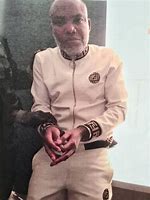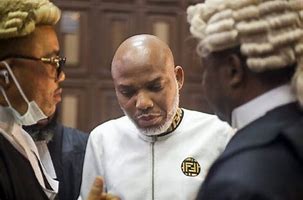
Nnamdi Kanu in detentionDr. Chike Obidigbo, a notable industrialist and philanthropist, has made a heartfelt appeal to politicians, particularly those from the South-East, urging them not to exacerbate the difficulties faced by Nnamdi Kanu, the leader of the Indigenous People of Biafra (IPOB).
Dr. Obidigbo expressed his concern over the actions of some Igbo political elites, criticizing their approach to the popular demand for Kanu’s release. He emphasized that their actions appear to be driven by ignorance and a desire for self-aggrandizement rather than genuine concern for Kanu’s plight.
In a statement released to journalists in Enugu on Sunday, Dr. Obidigbo, who is also the President of the Osisioma Foundation, highlighted the need for a more delicate and diplomatic approach to address Kanu’s incarceration. He stressed that the current approach of politicizing Kanu’s release could be counterproductive.
The statement reads: “I woke up this morning with a very heavy heart. I feel compelled to express my discomfort with the way our political elites are handling the call for the release of Mazi Nnamdi Kanu. It seems that their primary objective is to gain public attention rather than genuinely addressing the issue at hand.”
Dr. Obidigbo pointed out that President Bola Tinubu is not solely responsible for Kanu’s detention. He noted that even former President Muhammadu Buhari and his Attorney Generals, including the current one, are not the primary figures holding Kanu. He explained that Kanu’s case is a security matter that falls under the jurisdiction of the National Security Adviser (NSA), Nuhu Ribadu. While the President has the power to influence the situation, he may not have the absolute authority to release Kanu.
Dr. Obidigbo further emphasized that the British Government is a significant obstacle to Kanu’s freedom. He argued that Kanu’s actions were perceived as a threat to British economic interests in Nigeria. He elaborated that Britain, which has benefited from Nigeria’s resources for centuries, played a role in Kanu’s abduction and rendition from Kenya to Nigeria.
“Everything Kanu did was on British soil, as he is a British citizen. They couldn’t arrest him in Britain due to the potential backlash. Instead, they conspired internationally to have him kidnapped in Kenya and illegally transferred to Nigeria. Such actions would face severe repercussions outside Africa,” Dr. Obidigbo stated.
Dr. Obidigbo criticized the British High Commission in Nigeria for not speaking out against Kanu’s abduction. He argued that Britain’s actions reveal their long-term intentions to destabilize Nigeria for economic and political gains. He recalled how Britain thwarted the abduction of Alhaji Umaru Dikko in 1984, who wasn’t even a British citizen, highlighting Britain’s double standards.
He suggested that African youths are increasingly challenging such exploitation and manipulation. He pointed out that the Biafra movement has grown beyond Kanu, with other elements continuing the struggle. Dr. Obidigbo advised that efforts to free Kanu should focus on influential figures like the NSA and ambassadors from powerful nations such as Britain, the USA, China, and Russia.
“Without the support of these powerful countries, the struggle for Biafra will persist until a referendum is held as IPOB demands. If Kanu is released politically without a referendum, the movement will likely continue, delaying peace further,” he stated.
Dr. Obidigbo’s statement sheds light on the complex geopolitical and economic factors surrounding Nnamdi Kanu’s detention. He emphasized that the issue is not merely a legal or political matter but one that involves significant international interests. His call for a more diplomatic approach highlights the need for careful and strategic handling of the situation to avoid further complications.
He also touched on the historical context of Britain’s involvement in Nigeria, arguing that their economic interests have long driven their actions in the region. He suggested that Kanu’s agitation for Biafra challenges these interests, leading to the harsh response from both Nigerian and British authorities.
Dr. Obidigbo’s remarks reflect a deep concern for the future of the Biafra movement and the broader implications for Nigeria’s socio-economic stability. He urged politicians to move beyond self-interest and consider the long-term consequences of their actions. He called for a united and strategic approach to address Kanu’s detention and the broader issues surrounding the Biafra movement.
In conclusion, Dr. Obidigbo’s appeal underscores the need for a balanced and thoughtful approach to the challenges faced by Nnamdi Kanu and the IPOB. His emphasis on diplomacy and international engagement offers a pathway towards a peaceful resolution that addresses the legitimate concerns of all parties involved. By focusing on the broader geopolitical context and advocating for strategic diplomacy, Dr. Obidigbo provides a nuanced perspective on a highly complex and sensitive issue.





Add comment